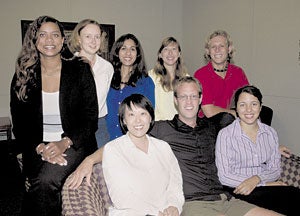Nine medical students named Schweitzer Fellows
GREENVILLE, N.C. (Aug. 31, 2002) — Nine students at the Brody School of Medicine at East Carolina University are working to change their community for the better and have been recognized for their work as North Carolina Schweitzer Fellows for 2002-2003.

N.C. Schweitzer fellows from the Brody School of Medicine are, standing from left, Tanika M. Pinn, Robin Gaines, Wafa Badwan, Renee Banaszak and Payson Thompson; seated, from left, Arlene Chung, Benjamin Gilmer and Andrea Locklear. Not pictured is Jennife
In North Carolina, 19 medical students were chosen as fellows, with ECU having the most. The Albert Schweitzer Fellowship continues the legacy of Dr. Albert Schweitzer, viewed as one of the great humanitarians of the 20th century. The fellowship was founded in 1940 to support the work of Schweitzer in Lambarene, Gabon, during World War II. Since that time, the fellowship has continued to support the hospital there as well as other programs and began sponsoring local programs to address unmet health care and social needs in the United States.
Following is a list of the fellows, all second-year medical students, and their projects:
- Renee Banaszak of Rocky Mount and Wafa Badwan of Greenville are conducting a yearlong breast cancer education program in Hertford, Bertie and Gates counties targeting church and civic groups and events such as the Cashie River Festival.
- Arlene Chung of Williamston is working with the uninsured, homeless and indigent population of Pitt County providing health screenings for diabetes and hypertension at the JOY Community Resource Center in Greenville. She will also provide health education and disease management information.
- Jennifer Farmer and Benjamin Gilmer, both of Charlotte, are enrolling uninsured people at the Fountain Indigent Care Clinic and Pitt County Memorial Hospital’s emergency department in local, state and federal health care programs, such as HealthAssist and Health Choice.
- Robin Gaines, originally from Easley, S.C., taught English as a second language and conducted a health education outreach program for migrant farm workers at the Snow Hill Medical Center earlier this summer.
- Andrea Locklear of Lumberton is conducting a two-part diabetes education program aimed at American Indians in Robeson County. She is distributing “Sweet Talk” diabetes awareness packets for patients in Lumberton-area physician offices and will be conducting information sessions in Robeson County at powwows to educate other Lumbees of their increased risk for diabetes.
- Tanika M. Pinn of Charlotte organized and led the Summer Leadership Conference for Teens in Greenville in June and July where participants learned about nutrition, stress and anger management and had leadership opportunities. She has also developed the “TeenReach” program, which focuses on either HIV or anti-smoking education from August to December.
- Payson Thompson of High Point is conducting diabetes and hypertension screenings and education for Latinos at St. Gabriel’s Catholic Church in Greenville. His project will provide screenings one Sunday each month through next June.
Dr. Tom Irons, president of HealthEast and associate vice chancellor for health sciences at ECU, has been involved in the Schweitzer fellows program since it began at ECU. “I believe the program has some extraordinary qualities about it,” he said. “The program offers health sciences students an opportunity to develop completely independent projects on their own, gives them limited funds, has them commit a certain number of hours and to just do something to improve the health of the underinsured.
“And the things that come out are unbelievable. They have great ideas and they find ways to fund their projects,”he said.
Having nine Schweitzer Fellows this year from ECU out the 19 total fellows speaks volumes about the medical students at the Brody School of Medicine, Irons said. “I don’t think I know of a Schweitzer fellow who comes out of the program not committed to helping the underinsured throughout his or her lifetime on some level,” he said. “We have more than any other medical school in